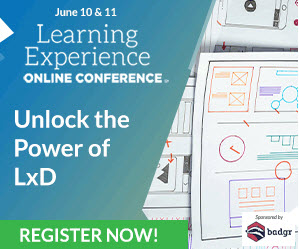David Kelly’s Curated L&D Content for the Week of 6/1/20

David Kelly, Executive Director, The eLearning Guild
In light of the ongoing COVID-19 crisis, this week’s resources continue to have the dual focus of providing resources that can help us navigate this troubling time, while also giving us new ways to expand the view we have on the work we do as L&D professionals.
Here’s a summary of this week’s content:
- An exploration of the differences between Emergency Remote Learning and Online Learning
- An important look at how our predictions of the future can often look different in reality
- Inspiration for your next infographics
- Tips on how to better support remote teams
- Specific ways you can become a better reader of educational research
Emergency Remote Learning Compared to Online Learning by Steven Shisley
We’ve heard a great deal about the shift to online learning during this pandemic, but in truth, much of what we’re seeing is less “online learning” and more “emergency remote teaching” from a practical standpoint. This post by Steven Shisley explores the important differences between the two concepts.
What Did the Games Industry Think 2020 Would Be Like in 2010? by Cam Shea
Predictions about the future of education and technology are extremely popular. They’re also often inaccurate, predicting rapid changes that, in practice, take time. This post by Cam Shea takes a different approach on the games industry, looking back on predictions from 2010 and gauging where they got things right, and where they were wrong.
7 Ideas to Spark Great Infographics by Nadya Khoja
Infographics are a popular form of content, one that learning and development professionals are increasingly looking to leverage in their work. This post by Nadya Khoja looks at the core purpose of a number of different types of infographics, and the lessons they provide about your own work.
How to Prepare Your Virtual Teams for the Long Haul by Mark Mortensen and Constance Noonan Hadley
Shifting to remote work affects more than just individual work; it also affects team dynamics. This post by Mark Mortensen and Constance Noonan Hadley looks at important questions to ask and tasks to consider to better prepare your team to coordinate virtually.
5 Steps to Becoming a Reader of Research by Zach Groshell
Staying on top of research related to education, training, and learning, can be an overwhelming challenge. This post by Zach Groshell provides a number of valuable tips that can help you be more intentional and tactical in your approach to consuming research.
What Exactly is LXD?
 Research into how we learn, coupled with greater demands by organizations for more effective and less intrusive workflow solutions, have forced traditional instructional design to evolve. The emergence of Learning Experience Design (LXD) is a convergence of the best practices from ID, learning technology, educational research, design thinking, and UX. But what is this new perspective on design, and what does it mean to the future of learning and development?
Research into how we learn, coupled with greater demands by organizations for more effective and less intrusive workflow solutions, have forced traditional instructional design to evolve. The emergence of Learning Experience Design (LXD) is a convergence of the best practices from ID, learning technology, educational research, design thinking, and UX. But what is this new perspective on design, and what does it mean to the future of learning and development?
The Learning Experience Design Online Conference explores the roots LXD has in science, technology, and ID, and provides resources for incorporating these skills into your work. We’ll explore various examples of LXD in practice, providing context that will help shift the mindsets of you, your team, and your organization to move your approaches to learning forward.

Leave a Reply